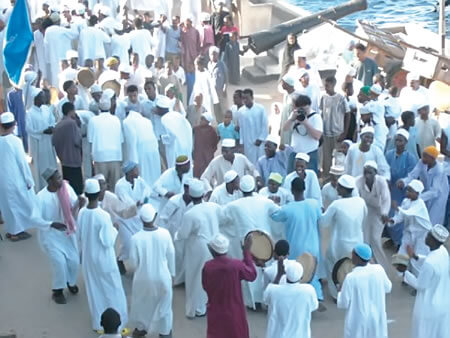LOTS of people argue over Christmas, whether it is the holy day to honour the birth of Jesus or a commercial, secular holiday. Muslims are no strangers to arguments, and have their own debates. No, not the debates over whether Muslims should celebrate Christmas but about the other important debate, the one over whether Muslims should honour the birth of the Prophet Muhammad.
Historically speaking, many Muslims have honoured the birth of Muhammad in a ritual called the Mawlid. These popular practices are festive occasions, often with decorations all over cities, featuring tents in which foods are handed out.
Connected to these festivities is a whole tradition of devotional songs that portray Muhammad not simply as the deliverer of the last divine dispensation (the Qur’an) but as a being of cosmic significance, an opening of a channel of divine mercy onto this world, and a means of intercession for us sinners.
It was this Muhammad — the cosmic Muhammad who served as the cause of creation, the Muhammad that God so loved that were it not for him creation would not have been (according to the Sacred Hadith, “Wa law laaka…” ) — who was and remains the object of Muslim devotion. Just as the moon reflects the light of the sun, so does Muhammad reflect the light of God onto the cosmos.

Perhaps the most famous of these devotional Mawlid poems is a Turkish version that dates back to about 700 years ago. Written by Suleyman Chelebi, this Mawlid poem (referred to in Turkish as the Mevlut) offers a somewhat rare point of view in Abrahamic traditions: a chance to see a central religious narrative from the point of view of a female character — in this case Muhammad’s mother, Amina. As has been characteristic of the Muslim tradition, the paramount quality of Muhammad emphasised here is that of rahmatun li ‘l-‘alamin (“a mercy to all the worlds”), a direct reference to Qur’an 21:107.
The next section of the poem is referred to as the great “Welcome,” in which all of the cosmos joins in welcoming the newborn Muhammad. This Muhammad is much more than simply a child; he is the cure for pain, one who is not separated from God, and a saintly being (“friend of God”), whom all will call upon to deliver them from sin in the days of the Hereafter.
Here is where the Mawlid goes from being a nativity poem to an everyday occasion of connecting to God. Muslims can celebrate Muhammad’s birthday anytime.
In fact, many Muslims hold Mawlid ceremonies during the course of the year. Why? Because the cosmic Muhammad is not born just once a year, but offers an opening to the divine anytime — here, now. So, the nativity poem to honour Muhammad is and can be recited at any time: in weddings, for example, or anytime that Muslims want to feel connected through God through the overflowing fountain of Muhammad’s mercy.
So, if the Mawlid is a chance to honour Muhammad, why would some Muslims object to such a celebration? Why would the Muslim blogosphere break out every year with debates over the properness of the Mawlid? For some Muslims, the objection is mainly an objection to the presentation of the cosmic Muhammad, which they feel glorifies Muhammad beyond his mere human dimension.
For other Muslims who object to the Mawlid, it is based on a notion of objecting to religious practices that have no sanction in Muhammad’s own practice. In other words, since Muslims are to emulate Muhammad’s own paradigm, the argument against the Mawlid is that Muhammad never celebrated his own birthday, neither did his immediate contemporary community. To put it in comparative context, it would be akin to arguing that Christ never celebrated Christmas, so neither should Christians.
The Mawlid gives us a useful chance to see the range of interpretations and practices marked as Muslim. As paradoxical as it sounds, it’s all about the love, even the disagreement. For the Muslims who honour Muhammad’s Mawlid, it’s the deep love for Muhammad that brings them closer to God. For those who identify as Salafi, and wish to abide only by practices that they believe originate in the Qur’an and the example of Muhammad, it is a way of honouring the desire to practise Islam as Muhammad would have wanted us to do, without what is deemed to be later accretions and potentially dubious practices. As the Prophet himself is reported to have said, disagreement among the scholars is a mercy.
Sources: www.onbeing.org and www.middleeasteye.net
WATCH TOP VIDEOS FROM NIGERIAN TRIBUNE TV
- Relationship Hangout: Public vs Private Proposals – Which Truly Wins in Love?
- “No” Is a Complete Sentence: Why You Should Stop Feeling Guilty
- Relationship Hangout: Friendship Talk 2025 – How to Be a Good Friend & Big Questions on Friendship
- Police Overpower Armed Robbers in Ibadan After Fierce Struggle






